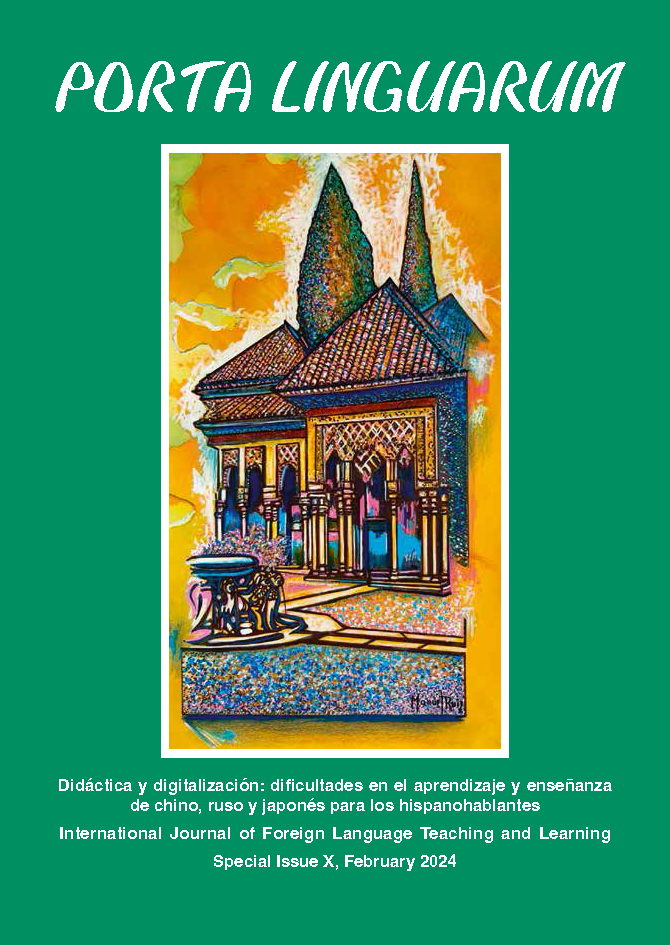Experiences of students of Chinese as a foreign language in Spain in online classes
DOI:
https://doi.org/10.30827/portalin.viX.27422Keywords:
Chinese as a foreign language, online classes, language skills, second language learning and teaching, COVID-19Abstract
The sudden digitalization of education in recent years has meant a radical transformation for students and educators. Forced and then driven by this technological current, both students and teachers in Spain encountered new challenges in online classes that are urgent to identify, in order to improve learning and teaching. A questionnaire-based study on the experiences and difficulties of students of Chinese as a foreign language in Spain has been conducted to investigate their perceptions on the development of language skills in face-to-face and online classes, and as a result, the low level of satisfaction of students in the development of language skills in online classes compared to face-to-face classes has been revealed. Future studies can be carried out based on this descriptive research of the current situation of digital teaching of Chinese as a foreign language in Spain.
Downloads
References
Cabero Almenara, J., Barroso Osuna, J. M., Rodríguez Gallego, M. R., & Palacios Rodríguez, A. d. P. (2020). La Competencia Digital Docente. El caso de las universidades andaluzas. Aula Abierta, 49(4).
Cui, X. (2020). 全球突发公共卫生事件背景下的汉语教学. 世界汉语教学, 34(3).
Cupeiro, S. V., & Arnau, A. G. (2022). La educación digital en los tiempos del COVID-19: La digitalización forzosa y el ensanchamiento de las brechas educativas. Teknokultura, 19(2).
Domingo-Coscollola, M., Bosco-Paniagua, A., Carrasco-Segovia, S., & Sánchez-Valero, J.-A. (2020). Fomentando la competencia digital docente en la universidad: Percepción de estudiantes y docentes. Revista de Investigación Educativa, 38(1).
Li, H., Lu, Y., Yao, J., & Deng, D. (2021). 疫情防控期间汉语国际教育在线教学的挑战与机遇——北京大学对外汉语教育学院个性化在线教学实践和反思. 北大青年研究(4).
Li, Y., Li, B., Song, H., Bellassen, J., Liu, L., Wu, Y., . . . Ren, Y. (2020). “新冠疫情下的汉语国际教育: 挑战与对策” 大家谈 (上). 语言教学与研究, (4).
Lu, J., Cui, X., Zhang, W., Zhang, P., Liang, X., Zheng, Y., . . . Gu, C. (2020). “新冠疫情下的汉语国际教育: 挑战与对策” 大家谈 (下). 语言教学与研究, (5).
ONTSI. (2021). TECNOLOGÍA + SOCIEDAD EN ESPAÑA 2021. Retrieved from Madrid: https://www.ontsi.es/sites/ontsi/files/2022-01/tecnologiasociedadespa%C3%B1a2021_0.pdf
Ruiz, J. P. (2022). Clases en línea y competencia digital en estudiantes taiwaneses de español durante la pandemia COVID-19. Porta Linguarum: revista internacional de didáctica de las lenguas extranjeras(38).
Tong, C., & Bai, L. (2020). 新冠疫情下蒙古国在线汉语教学状况及策略. 中国多媒体与网络教学学报 (上旬刊).
Vázquez Cupeiro, S., & García Arnau, A. (2022). La educación digital en los tiempos del COVID-19: La digitalización forzosa y el ensanchamiento de las brechas educativas. Teknokultura. Revista de Cultura Digital y Movimientos Sociales, 19(2), 119-121. doi:10.5209/tekn.81157
Vega Gil, L., Lambea Ortega, M., Revesado Carballares, D., & Vargas Hernández, Y. (2021). Educación y escuela en España en tiempos de pandemia. Linhas Críticas, 27.
Wang, Q., & Li, B. (2020). 利用问卷调查疫情时期的对外汉语线上教学. 中文教学现代化学报, 9(2). Retrieved from http://xuebao.eblcu.com/xuebao/essay/eightteen/04.pdf
Zhang, P. (2020). 疫情期间英国汉语教育的线上发展. 世界教育信息, 33(7).
Zhang, Q. (2020). Narrative inquiry into online teaching of Chinese characters during the pandemic. International Journal of Chinese Language Teaching, 1(1).
Zhao, L. X., Blankinship, B., Duan, Z., Huang, H., Sun, J., & Bak, T. H. (2020). Comparing face-to-face and online teaching of written and spoken Chinese to adult learners: An Edinburgh-Sheffield case study. International Journal of Chinese Language Teaching, 1(1).
德语区汉语教学协会. (2010). 德语区汉语教学协会对新汉语水平考试的几项说明. Retrieved from https://www.fachverband-chinesisch.de/fileadmin/user_upload/Chinesisch_als_Fremdsprache/Sprachpruefungen/HSK/FaCh2010_ErklaerungHSK_en.pdf
教育部中外语言交流合作中心. (2021). Chinese Proficiency Grading Standards for International Chinese Language Education. Ministry of Education; State Language Commission Retrieved from http://www.moe.gov.cn/jyb_xwfb/gzdt_gzdt/s5987/202103/W020210329527301787356.pdf



















